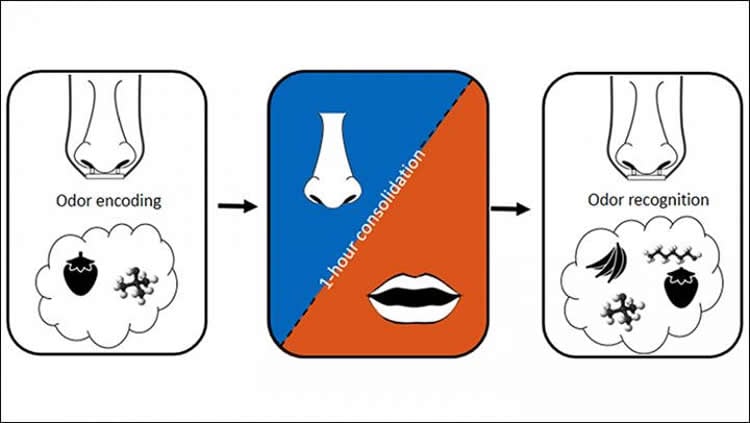Summary: A new study reports you may be able to improve long term memory consolidation by simply breathing through your nose.
Source: SfN.
Breathing through the nose may improve the transfer of experience to long-term memory, finds a study of human adults published in Journal of Neuroscience. The findings add to growing evidence for the influence of respiration on human perception and cognition.
Building on previous research in animals and humans, Artin Arshamian and colleagues compared the effects of nose breathing and mouse breathing during a one-hour consolidation period after participants were exposed to various odors.
Nose breathers, whose mouths were taped over during the consolidation period, showed increased odor recognition compared to mouth breathers, whose noses were clipped during consolidation.
Although this study did not measure brain activity, the researchers suggest that nose breathing may facilitate communication between sensory and memory networks as memories are replayed and strengthened during consolidation.

The study provides evidence that, in addition to its effects on memory encoding and retrieval, nasal respiration also supports memory consolidation.
Funding: Funding provided by Swedish Research Council, Netherlands Organization for Scientific Research, Knut and Alice Wallenberg Foundation.
Source: David Barnstone – SfN
Publisher: Organized by NeuroscienceNews.com.
Image Source: NeuroscienceNews.com image is credited to Arshamian et al., JNeurosci (2018).
Original Research: Abstract for “Respiration modulates olfactory memory consolidation in humans” by Artin Arshamian, Behzad Iravani, Asifa Majid and Johan N. Lundström in Journal of Neuroscience. Published October 22 2018.
doi:10.1523/JNEUROSCI.3360-17.2018
[cbtabs][cbtab title=”MLA”]SfN”Nose Breathing Enhances Memory Consolidation.” NeuroscienceNews. NeuroscienceNews, 22 October 2018.
<https://neurosciencenews.com/nose-breathing-memory-10070/>.[/cbtab][cbtab title=”APA”]SfN(2018, October 22). Nose Breathing Enhances Memory Consolidation. NeuroscienceNews. Retrieved October 22, 2018 from https://neurosciencenews.com/nose-breathing-memory-10070/[/cbtab][cbtab title=”Chicago”]SfN”Nose Breathing Enhances Memory Consolidation.” https://neurosciencenews.com/nose-breathing-memory-10070/ (accessed October 22, 2018).[/cbtab][/cbtabs]
Abstract
Respiration modulates olfactory memory consolidation in humans
In mammals, respiratory-locked hippocampal rhythms are implicated in the scaffolding and transfer of information between sensory and memory networks. These oscillations are entrained by nasal respiration and driven by the olfactory bulb. They then travel to the piriform cortex where they propagate further downstream to the hippocampus and modulate neural processes critical for memory formation. In humans, bypassing nasal airflow through mouth-breathing abolishes these rhythms and impacts encoding as well as recognition processes thereby reducing memory performance. It has been hypothesized that similar behavior should be observed for the consolidation process, the stage between encoding and recognition, were memory is reactivated and strengthened. However, direct evidence for such an effect is lacking in human and non-human animals. Here we tested this hypothesis by examining the effect of respiration on consolidation of episodic odor memory. In two separate sessions, female and male participants encoded odors followed by a one hour awake resting consolidation phase where they either breathed solely through their nose or mouth. Immediately after the consolidation phase, memory for odors was tested. Recognition memory significantly increased during nasal respiration compared to mouth respiration during consolidation. These results provide the first evidence that respiration directly impacts consolidation of episodic events, and lends further support to the notion that core cognitive functions are modulated by the respiratory cycle.
SIGNIFICANCE STATEMENT
Memories pass through three main stages in their development: encoding, consolidation, and retrieval. Growing evidence from animal and human studies suggests that respiration plays an important role in the behavioral and neural mechanisms associated with encoding and recognition. Specifically nasal, but not mouth, respiration entrains neural oscillations that enhance the encoding and recognition processes. We demonstrate that respiration also affects the consolidation stage. Breathing through the nose compared to the mouth during consolidation enhances recognition memory. This demonstrates, first, that nasal respiration is important during the critical period were memories are reactivated and strengthened. Second, it suggests that the neural mechanisms responsible may emerge from nasal respiration.






